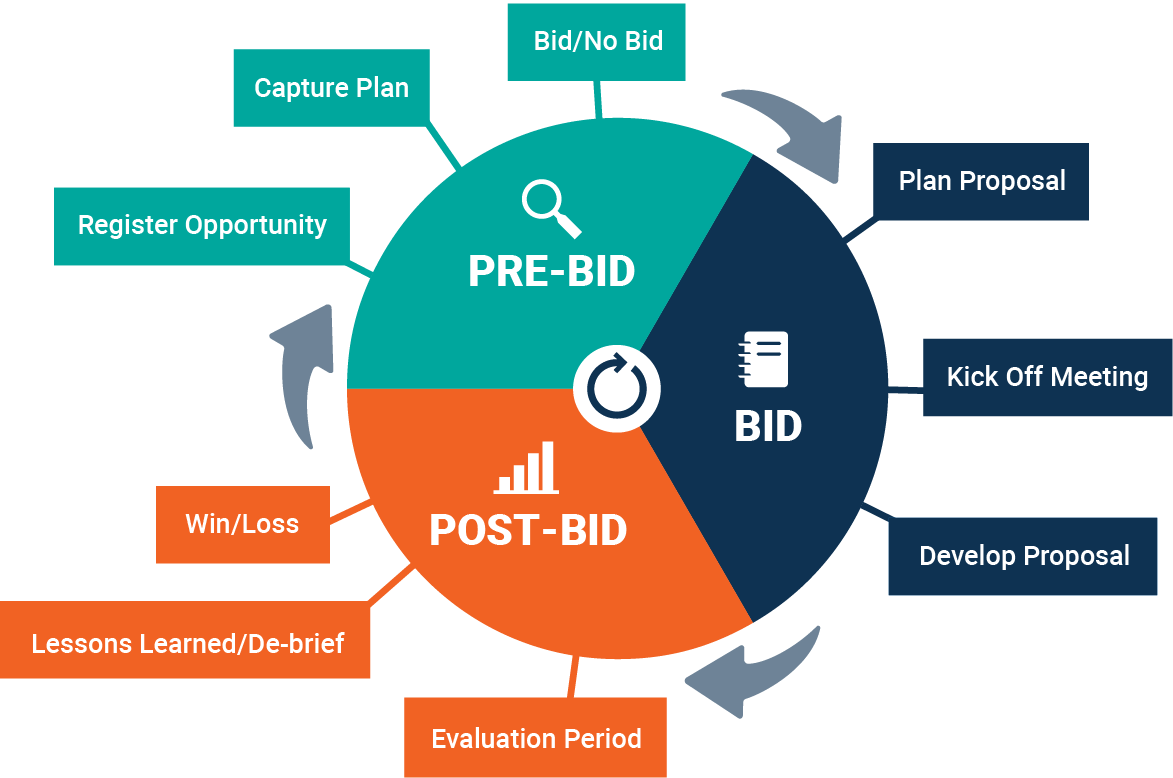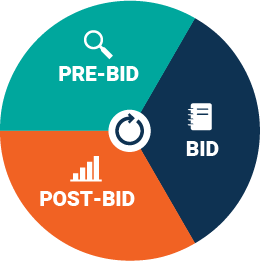Bid lifecycle – overview
At Bidhive, we want everyone to learn how to bid! Bidding is a craft, but a repeatable process that needs to be shared – especially as the future of work continues to automate, and supply chain ecosystems become more digitized and connected. If you’re a bid manager, or are involved in evaluating opportunities and participate in RFP or submission deliverables as a subject-matter expert, project lead, estimator, strategist or business owner – learning about the bid lifecycle and end-to-end bidding best practice is relevant to you. Bidding is a team effort, so understanding how roles and responsibilities work together will help everyone understand how to work together to become a winning team.
In this lesson we provide an overview of the end-to-end process and bid lifecycle. We introduce you to common terminology and the evaluation criteria that influence contractor and supplier selection.
Key topics:
- The bid lifecycle: What Does ‘End-to-End’ Really Mean?
Introduction
Companies that consistently follow a defined business development process – that is, a set of repeatable steps and methodologies – win more business and invest fewer resources on each opportunity.
In the bid management and business development world these key steps are often referred to as the “end-to-end” process, or the “bid lifecycle” which begins at the opportunity identification stage and finishes at contract award. Across each main ‘phase’ (pre-bid; bid; no-bid) are key steps and linkages with many role-based activities and tasks.

There are many benefits of a repeatable end-to-end bid process that follows the bid lifecycle, including:
- lower business development costs
- improved productivity and team collaboration
- greater visibility into resource allocation and capacity
- compliance with organisational policies and requirements
- better insight into performance outcomes to support business analysis and management decision making.
Proposal development is only one part of the whole picture, although many would argue that this is the most painful part of the process! Why is this? It’s most often due to the unplanned, ad-hoc nature of the process, and the multitude of contributors working long hours together in a highly stressful, compressed timeframe.
When there is little or no warning of a tender invitation arriving, it can be extremely disruptive to an organisation, especially when it is forced to re-allocate resources away from business as usual. For this reason, highly strategic organisations plan their opportunities ahead of the RFx being released so that they are well prepared. This includes spending time on the Bid/No Bid decision to qualify the opportunity, and allocating the required resourcing for the Capture and Proposal development phases.
Bidhive’s end-to-end platform supports the full business development lifecycle by supporting cross functional collaboration and providing greater visibility into the bid process even before the documentation has been issued.
From opportunity through to contract award, Bidhive helps bid teams to plan, manage and track their bid activity across the end-to-end process (or bid lifecycle), giving organisations large and small single source of truth of corporate knowledge and business intelligence, as well as a central record of bid inputs and outcomes to support compliance and continuous improvement.
Pre-bid
Qualifying your opportunities
The pre-bid phase is the first of three phases in the bid lifecycle and it lays the foundation for success. This critical phase focuses on gaining organisational support to respond to the opportunity, and developing a collaborative plan to win.
Companies that don’t spend time in the pre-bid phase may be setting themselves up to lose, and wasting precious organisational time and resources in the process.
Bidhive provides the processes, tools, techniques and templates to help organisations implement and systematise pre-bid activity quickly and effectively.
Main steps



Essential tools
- Tender Alert / Open Contracts search
- Organisational Bid Register
- Business & Competitive Intelligence
- Bid/No Bid Decision Tool
Bid
From invitation to deadline of the submission
Developing a proposal or bid response is time consuming and usually high pressure work involving large amounts of documentation, searching for information and coordinating numerous stakeholders and content contributors. Timeframes are being increasingly compressed while customer requirements have become more complex.
Tender questions have evolved from simple yes/no answers and straight forward company background and credentials, to being oriented towards process, risk management and problem-solving capability.
Proven and repeatable processes, collaboration and supporting tools and technology are key elements of effective bid teams but they don’t replace the importance of soft skills and knowledge that belong to the people who work in the company.
We’ll show you how Bidhive can be used to streamline the critical steps in planning your bids to help you save time, become more organised, and create a complete and detailed bid response using a more standardised process across your team.
Main steps



Essential tools
- Content Library
- Writing Plan / Storyboard
- Bid Tracker
- Kick Off Meeting Agenda
- Compliance and Risk Matrix
Post-Bid
Outcomes monitoring and reporting
As soon as you start tracking and measuring your performance, you can better identify areas where you can improve. When the bidding phase ends, your organisation’s knowledge of the internal bid process, the customer and your competitors is at its peak and should be captured!
Closing the loop on the bid cycle means capturing all of your lessons learned, your bid outcome (win or loss), as well as the reasons why so you can continue to build on previous knowledge, results and team dynamics to improve your next bid, and return on investment.
The Bidhive dashboard reports will provide you with insights using closed loop data to help you make better strategic and tactical decisions.
Main steps



Essential tools
- Lessons Learned Questionnaire
- Debrief Record
- Win/Loss Register, Dashboard Report and Analytics
Other topics
The Bid Lifecycle
Pre-bid
Bid
Post-bid


